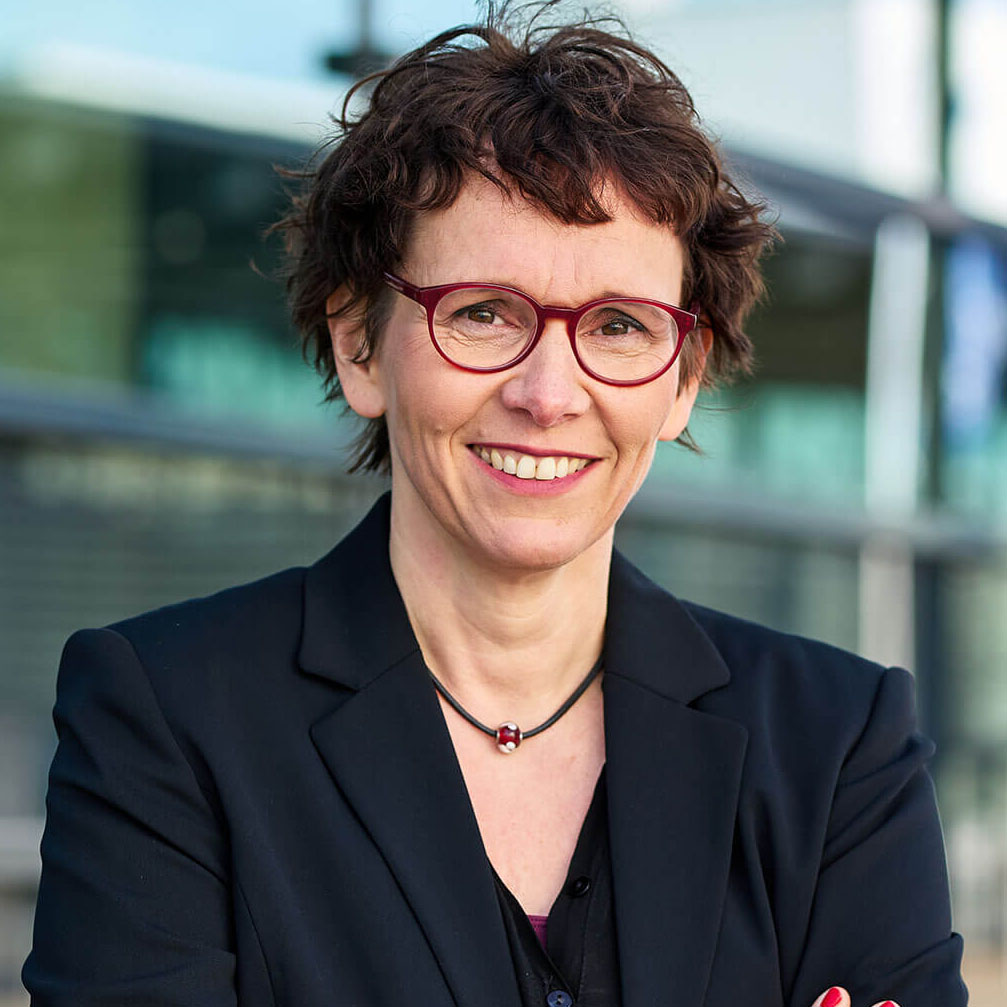Almut Schnerring (she/her)
The root cause of gender inequality is the unfair distribution of care work.

I’m an author, journalist and I travel a lot in German-speaking countries with lectures and workshops. My topic is freedom of choice or what stands in its way: limiting role models. I am often, but not exclusively, concerned with gender roles and the question: how did we actually become what we are? How we behave, what pleases or bothers us, and how satisfied we are with each of these. Where do we feel limited in our possibilities and how can we enable the next generation to have more freedom of choice? What structures and social norms stand in the way?
After many years of writing and speaking, I realized that it takes more than clever texts and scientific studies to bring about real social change, it takes the union of active and committed people who together drive this change and increase the social pressure so much that we can foster change on a political level.
Since then I have been trying to create open dialog spaces and networks, for example with the ‘Equal Care Day’ for more appreciation, visibility and a fair distribution of care work and the ‘Goldenen Zaunpfahl – Award for absurd gender marketing.
With the focus on equality, my parents’ lifestyle was not ideal, but typical for the middle class in the 1970s: my father worked full-time and my mother earned extra hours. All in all, a good 50 hours of gainful employment per week was enough to support a family. Today, there is an outcry when we and many others demand exactly that, 25 hours of full-time work. After all, what kind of model is this, where two working people cannot support a family together, but sometimes even juggle several jobs? It can’t be that single parents have to work for two, leaving no time for care, children and life! So please, 25 hours per week as the new measure for a full-time position, starting tomorrow.
I have three children, each 2 years apart in age. As parents, my partner and I were both shocked and fascinated by how quickly the children’s lives changed between 2005 and 2010, and how quickly and massively this strict assignment of colors to pink and blue took hold. And it’s not just colors, but entire worlds that were suddenly offered separately according to gender, on the one hand technology and adventure, on the other household and beauty. That’s how the book came about. And then, for a while, nothing happened at all, because 10 years ago, not as many people were interested in this topic as today.
Educators and teachers were even more convinced than today that they were working in a gender-sensitive way (numerous studies show that for the majority, unfortunately, this is not true), parents also predominantly believe that they treat their children equally (which is neither possible nor desirable), and for politics and the media, the ongoing reproduction of gender roles was not even a marginal topic.
Fortunately, this has since changed and awareness and resistance are steadily growing, and the term ‘pink-blue trap’ has become a catchphrase for the phenomenon of ‘unconscious gender bias’ for many.
Equal Care i.e., the fair distribution of care work, is the basic prerequisite for an equal society. This is not just about gender, but also about origin, class, educational socialization, and so on.
If we then look at who makes it to the top in politics, associations and business, in the media, culture and science, and thus has decision-making power, then these are people, mostly white men, who personally assume little responsibility for care. Conversely, this means that people with care responsibilities are disadvantaged and made invisible at all levels of society.
For employers, the issue of equal care is relevant in two ways. On the one hand, the unequal distribution of private care responsibilities is one of the main reasons why women, in particular, take a back seat in their careers and are thus lost to companies in the long term.
On the other hand, care work, which is so important for the cohesion, mood and success of work teams, is also unequally distributed within companies. This is too rarely seen and leads to women and their contribution being systematically undervalued.
To get to the bottom of this grievance, for example, I developed the MentalLoad-Test@Work together with Patricia Cammarata.
We have been talking for a long time and still talk a lot about equal pay, about women in leadership positions and representation in politics and the media. These are important issues, but ultimately, we are only treating the symptoms and not the root causes of inequality. That’s why so little has happened in recent decades, too.
The real cause of gender inequality is the unfair distribution of care work. And this doesn’t just occur when people grow up and start families; this inequality is ingrained because even little girls are much more involved and taken for granted in everyday family work and have to take on more responsibility than their brothers. And from there on, the gap gets wider and wider. So, what we should and can change in the next 3 – 5 years would be, for example, an adjustment of the entire education system so that it no longer only prepares for the later employment biography, but empowers and encourages children and young people to develop and live a care biography as well.
If children grow into the world of work with different, fair role perceptions, there is a chance that an economic system will develop that is no longer based on the exploitation of care work. In recent decades, the narrative has been enforced that care work is expensive and burdensome and must first be financed by the other sectors of the economy.
This is fundamentally wrong: without care work, there would be no economy at all, no committed, well-educated, empathetic, team-oriented people for companies to hire. After all, our economic system only works because we deliberately overlook this grievance, because we push into the invisible those who ensure that companies find employees who are “cared for” in the truest sense of the word: fed, diapered, comforted, educated and motivated as a young person.
The education system and the economic system, these are just two areas, but Care permeates the whole of life from cradle to grave (in my book ‘Equal Care. On Care and Society’, together with Sascha Verlan), I summarized further necessary, structural changes for a care-sensitive society.
It is time for politics and business to recognize care work as an indispensable value and to factor it into their models and financing plans accordingly.
In 2016, when we first made the idea of an Equal Care Day public, there were two of us. In 2020, when we were able to celebrate Equal Care Day as part of a two-day conference with the support of the Federal Agency for Civic Education, we were a very small team and, at the core, there were still only three of us. Since then, the development of the initiative, including its financing, has always lagged behind and run parallel to the work on content.
And we keep asking ourselves what would be possible if the financial and organizational basis were in place. But in the political and media context, the care sector is strongly subdivided (and played off against each other): private vs. professional, education, social work, medicine, nursing, obstetrics and psychotherapy, cleaning, outpatient vs. inpatient … and for each sub-sector there are different, changing and overlapping responsibilities. This makes it difficult to impossible to arrive at collaborative, solidarity-based and sustainable solutions and changes.
With the pandemic, requests to us have increased, and yet as an initiative we have no basic funding. We have no office, no sponsors, and only a few sustaining members.
This means that we do all our work on a voluntary basis. More backing from the companies and associations that find our work important is therefore an urgent wish.
Of course, we are constantly confronted with our own socialization and internalized stereotypes. And with a media or school environment, for example, that doesn’t even perceive this problem as such. I would like to be able to look away more often, to let go and find it unimportant. But I experience with my children how present the clichés are everywhere and how much they limit children. In advertising, toys, clothes, food, in films and books, there are always these stereotypical role models and a world that does not correspond to our ideals, that does not allow any real freedom of choice, but instead gives clear guidelines on how a real boy/man should be, and how completely different a real woman/girl should be.
In addition, there is the political and legal framework that does not provide for an equal division of care and gainful employment. I share care and gainful employment with my partner, and this means that we have to justify and explain ourselves over and over again. In addition, for us, as for many others, the workload with three children has increased so much in the past pandemic years that we have to repeatedly cut back on the life we would actually like to lead.
I wish that people who carry out care work, whether for children, for relatives, for neighbors… would be seen more and that their contribution to society would not be brushed aside as a private decision.
- Participate in the equalcareday 2024! More info here
- Learn more about sponsor membership as a company or private individual now
- Learn more about the Betterplace projects for RosaHellblaufalle

Support us by sharing our content!
Related Links
- Rosa-Hellblau-Falle
- Goldener Zaunpfahl – Award für absurdes Gendermarketing
- Equal Care Day
- Mental Load Test – Download
- Jetzt mehr zur Fördermitgliedschaft als Unternehmen oder Privatperson erfahren
- Hier kannst du die Projekte direkt bei betterplace unterstützen
- Childrens’ book from Almut Schnerring (GERMAN)
